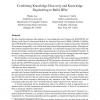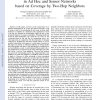559 search results - page 3 / 112 » Knowledge Networking in Cross-Cultural Settings |
DKE
2008
13 years 7 months ago
2008
Knowledge validation, as part of knowledge base verification and validation is a critical process in knowledge engineering. The ultimate goal of this process is to make the knowle...
EUROISI
2008
13 years 9 months ago
2008
This paper presents an application of information theory to identify sets of key players in social networks. First, we define two entropy measures that we use to analyze the struct...
HICSS
2006
IEEE
14 years 1 months ago
2006
IEEE
One viewpoint of a knowledge network is a knowledge map that clusters similar knowledge sources into knowledge domains. What is needed is an automatic mapping tool that 1) takes t...
RAID
1999
Springer
13 years 12 months ago
1999
Springer
We have been developing a data mining (i.e., knowledge discovery) framework, MADAM ID, for Mining Audit Data for Automated Models for Intrusion Detection [LSM98, LSM99b, LSM99a]. ...
COMSWARE
2007
IEEE
14 years 1 months ago
2007
IEEE
— In this paper, we focus on the construction of an efficient dominating set in ad hoc and sensor networks. A set of nodes is said to be dominating if each node is either itself...


